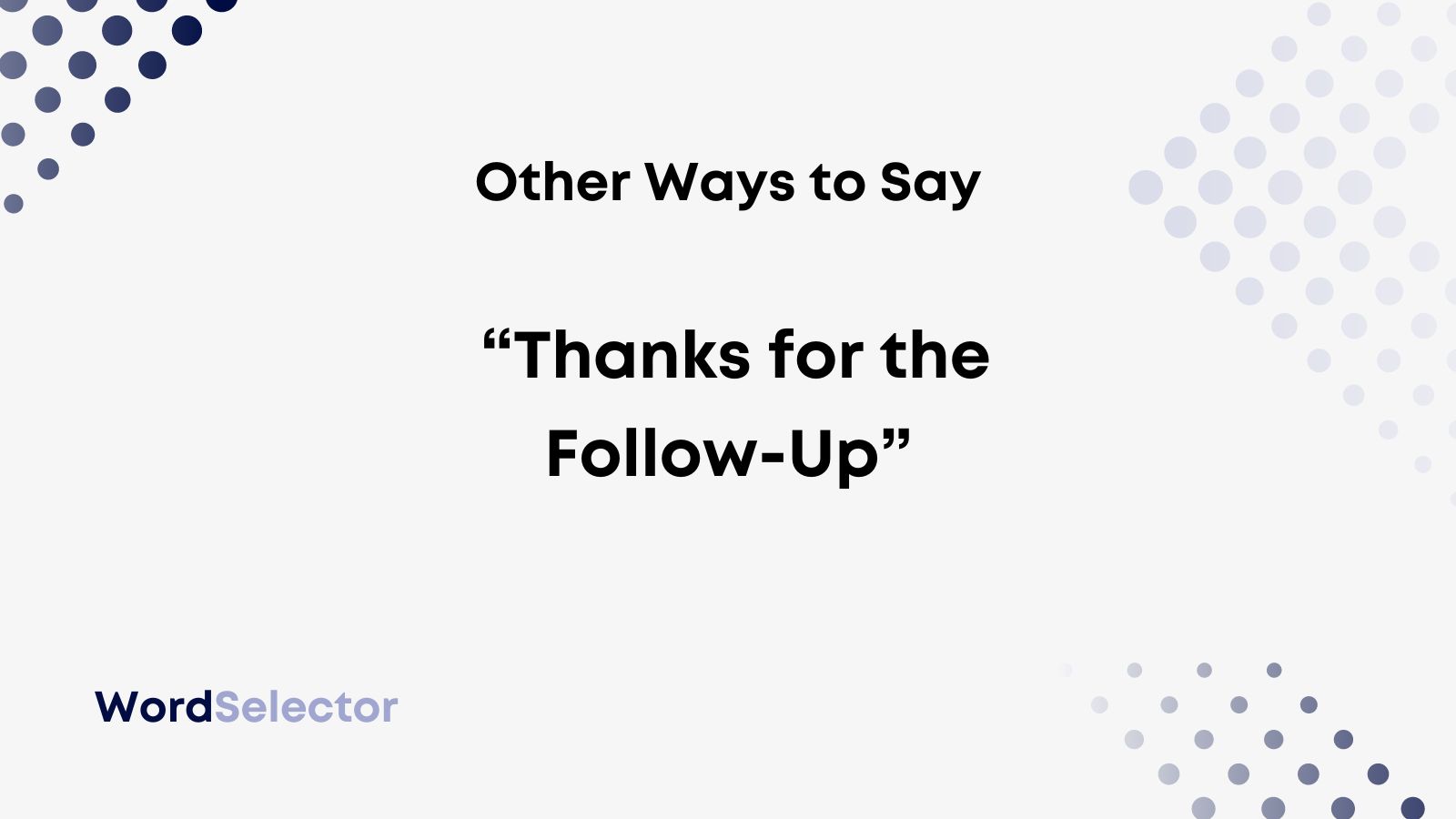There are plenty of great reasons to need a follow-up from someone. Follow-up emails share information related to previous conversations.
You should typically thank someone when they provide follow-ups. Something like “thanks for the follow-up” works, but is it the only acceptable phrase?
This article will explore how to thank someone for following up in an email.
Other Ways to Say “Thanks for the Follow-Up”
- I appreciate the update
- Thank you for the heads-up
- I appreciate your following up
- Thanks so much for the update
- I appreciate your follow-up
- Thanks for staying in touch
- Cheers for the reminder
- I appreciate your persistence
- I’m glad you kept me in the loop
- Thanks for the response
- I’m grateful that we’re moving forward with this
KEY TAKEAWAYS
- “Thanks for the follow-up” is correct and suitable in formal emails.
- Try “I appreciate the update” to keep things interesting as a professional alternative.
- “Thank you for the heads-up” works really well as a slightly more informal synonym.
Keep reading to find out more about the most effective phrases. We’ve touched on the best formal and informal options showing you how to say “thanks for the follow-up.”
You can also skip to the end to learn if “thanks for the follow-up” is correct. It’s good to know how to say thank you for a follow-up in the most appropriate way, after all.
I Appreciate the Update (Formal)
Another way to say “thanks for the follow-up” is “I appreciate the update.” It’s a great formal message to include when someone sends updated information.
It’s appreciative and polite. So, you can’t go wrong with it when including it in a professional email.
Generally, this works best when you respect the recipient. It shows you’re grateful they came and gave you the information.
For instance, you can use it when emailing clients. If they’ve updated you about a project you’re working on, then you can consider it as valuable information.
The more valuable the information, the more appreciative you should be. That’s why a phrase like this one works so well.
Here is a great email example to help you understand it:
Dear Carla,
I appreciate the update you’ve provided me with. I’ll be sure to act on it when I next speak to the team.
Yours,
Freddy Mercurial
Thank You for the Heads-Up (Informal)
For a more informal option, try “thank you for the heads-up.” It shows you how to say thank you for a follow-up in a slightly more conversational manner.
This time, we use “heads-up” instead of “follow-up.” It’s more casual and shows you appreciate the update message.
Also, feel free to switch “thanks” and “thank you” around in your writing. Both are effective (and common) ways to share genuine appreciation with someone.
In this instance, you can try it when replying to an email about an application. If you’ve applied to a more casual job, this could be a good way to introduce yourself to an employer.
This sample email should also help you:
Dear Roger,
Thank you for the heads-up. I’m glad you’re looking into my application for the role, as I know I’ll be a good fit.
All the best,
Michael Tisdale
Is It Correct to Say “Thanks for the Follow-Up”?
It is correct to say “thanks for the follow-up.” It works best after someone has provided you with a follow-up related to a previous email.
For instance, you can say “thanks for the follow-up” after an interview. It suggests that you’re happy to hear about the progress of your application (whether you’re successful or not).
Here’s an example to help you with it:
Dear Mr. Jenkins,
Thanks for the follow-up regarding my application. I’m so glad you decided to go with me.
All the best,
Peter Schmidt
You should always hyphenate “follow-up” when used in this context. For instance:
- Correct: Thanks for the follow-up.
- Incorrect: Thanks for the follow up.
You can also use either of these variations:
- Thanks for the follow-up.
- Thanks for following up.
Both are correct. “The follow-up” refers to an update as a noun. It means the “follow-up” information is what you’re thanking someone for.
“Following up” is a phrasal verb. Therefore, “thanks for following up” shows you’re thanking someone for their actions rather than the email’s content.
Generally, you would say “thanks for the follow-up” rather than “thanks for your follow-up.” While both are technically correct, “thanks for your follow-up” sounds a bit more jarring.

